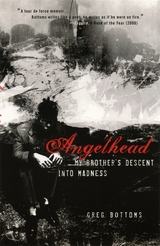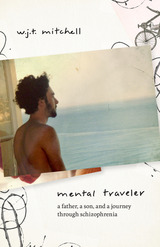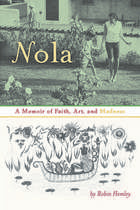3 books about Schizophrenics

Angelhead
My Brother's Descent into Madness
Greg Bottoms
University of Chicago Press, 2005
A taut, powerful memoir of madness, Angelhead documents the violent, drug-addled descent of the author's brother, Michael, into schizophrenia. Beginning with Michael's first psychotic break—seeing God in his suburban bedroom window while high on LSD—Greg Bottoms recounts, in gripping, dramatic prose, the bizarre disappearances, suicide attempts, and the shocking crime that land Michael in the psychiatric wing of a maximum security prison. A work of nonfiction with the form and imagery of a novel, Angelhead enables the reader to witness not only the fragmenting of a mind, but of a family as well.
"A tour-de-force memoir. . . . Bottoms writes like a poet, he writes like he is on fire."—Esquire, Book of the Year, 2000
"Angelhead is a brilliant, albeit inconceivably sad book. The fact that Bottoms survived the ordeal is incredible. But the fact that he could write about it with such pathos and insight is nothing less than extraordinary."—Atlanta Journal-Constitution
"Greg Bottoms has provided a biographical novel about his brother that may be as close as most of us will ever get to knowing what it is to be truly mad. Angelhead is a story nearly as terrifying as the disease it describes."—Psychology Today
"A tour-de-force memoir. . . . Bottoms writes like a poet, he writes like he is on fire."—Esquire, Book of the Year, 2000
"Angelhead is a brilliant, albeit inconceivably sad book. The fact that Bottoms survived the ordeal is incredible. But the fact that he could write about it with such pathos and insight is nothing less than extraordinary."—Atlanta Journal-Constitution
"Greg Bottoms has provided a biographical novel about his brother that may be as close as most of us will ever get to knowing what it is to be truly mad. Angelhead is a story nearly as terrifying as the disease it describes."—Psychology Today
[more]

Mental Traveler
A Father, a Son, and a Journey through Schizophrenia
W. J. T. Mitchell
University of Chicago Press, 2020
How does a parent make sense of a child’s severe mental illness? How does a father meet the daily challenges of caring for his gifted but delusional son, while seeking to overcome the stigma of madness and the limits of psychiatry? W. J. T. Mitchell’s memoir tells the story—at once representative and unique—of one family’s encounter with mental illness and bears witness to the life of the talented young man who was his son.
Gabriel Mitchell was diagnosed with schizophrenia at age twenty-one and died by suicide eighteen years later. He left behind a remarkable archive of creative work and a father determined to honor his son’s attempts to conquer his own illness. Before his death, Gabe had been working on a film that would show madness from inside and out, as media stereotype and spectacle, symptom and stigma, malady and minority status, disability and gateway to insight. He was convinced that madness is an extreme form of subjective experience that we all endure at some point in our lives, whether in moments of ecstasy or melancholy, or in the enduring trauma of a broken heart. Gabe’s declared ambition was to transform schizophrenia from a death sentence to a learning experience, and madness from a curse to a critical perspective.
Shot through with love and pain, Mental Traveler shows how Gabe drew his father into his quest for enlightenment within madness. It is a book that will touch anyone struggling to cope with mental illness, and especially for parents and caregivers of those caught in its grasp.
Gabriel Mitchell was diagnosed with schizophrenia at age twenty-one and died by suicide eighteen years later. He left behind a remarkable archive of creative work and a father determined to honor his son’s attempts to conquer his own illness. Before his death, Gabe had been working on a film that would show madness from inside and out, as media stereotype and spectacle, symptom and stigma, malady and minority status, disability and gateway to insight. He was convinced that madness is an extreme form of subjective experience that we all endure at some point in our lives, whether in moments of ecstasy or melancholy, or in the enduring trauma of a broken heart. Gabe’s declared ambition was to transform schizophrenia from a death sentence to a learning experience, and madness from a curse to a critical perspective.
Shot through with love and pain, Mental Traveler shows how Gabe drew his father into his quest for enlightenment within madness. It is a book that will touch anyone struggling to cope with mental illness, and especially for parents and caregivers of those caught in its grasp.
[more]

Nola
A Memoir of Faith, Art, and Madness
Robin Hemley
University of Iowa Press, 1998
The evidence at hand: an autobiography—complete with their mother’s edits—written by his brilliant and disturbingly religious sister; a story featuring actual childhood events, but published by his mother as fiction; the transcript of a hypnotherapy session from his adolescence; and perjured court documents hidden in a drawer for decades. These are the clues Robin Hemley gathers when he sets out to reconstruct the life of his older sister Nola, who died at the age of twenty-five after several years of treatment for schizophrenia. Armed with these types of clues, Hemley quickly discovers that finding the truth in any life—even one’s own—is a fragmented and complex task.
Nola: A Memoir of Faith, Art, and Madness is much more than a remembrance of a young woman who was consumed her entire life by a passion for finding and understanding God; it is also a quest to understand what people choose to reveal and conceal, and an examination of the enormous toll mental illness takes on a family. Finally, it is a revelation of the alchemy that creates a writer: confidence in the unknowable, distrust of the proven, tortuous devotion to the fine print in life, and sacrifice to writing itself as it plays the roles of confessor, scourge, and creator.
Upon its first release in 1998, Nola won ForeWord’s Book of the Year Award for biography/memoir, the Washington State Book Award for biography/memoir, and the Independent Press Book Award for autobiography/memoir. [more]
READERS
Browse our collection.
PUBLISHERS
See BiblioVault's publisher services.
STUDENT SERVICES
Files for college accessibility offices.
UChicago Accessibility Resources
home | accessibility | search | about | contact us
BiblioVault ® 2001 - 2024
The University of Chicago Press









